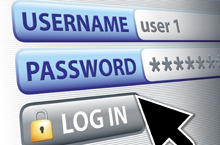
Following the recent rash of cyber-attacks on companies like Apple, Citibank, and Sony, as well as government organizations including the FBI and CIA, the importance of having strong passwords is being emphasized.
Passwords protect everything from email to banking, and most people have multiple online accounts. Ideal passwords are long, random, and difficult to predict – s4D7*0/!!3p for example – which also makes them hard to remember. People also often use the same password, or a variation of it, for a number of accounts, which makes it easy on hackers.
To help protect yourself online, choose a password with no personal connection. Don’t use words that can be linked back to you, like a pet’s name, your favourite vacation spot, a nickname, or phone number, and include numbers, symbols, and letters when creating your password.
The longer the password the better, but a five or six character password like 9*s)3x is more secure than a longer one that contains only words, such as ‘ilovenewyorkcity’.
Don’t use the same password for multiple accounts. If you have trouble remembering them all, consider using a password-managing software like LastPass, that can encrypt and store all of your passwords in one secure location.
Change your passwords every few months, especially for your online banking, and sites like Amazon that store your credit card information. Log in to sensitive accounts using a secure internet connection only, not when using public WiFi.
While no password is completely safe from being cracked, taking these simple precautions will go a long way in protecting yourself online.

